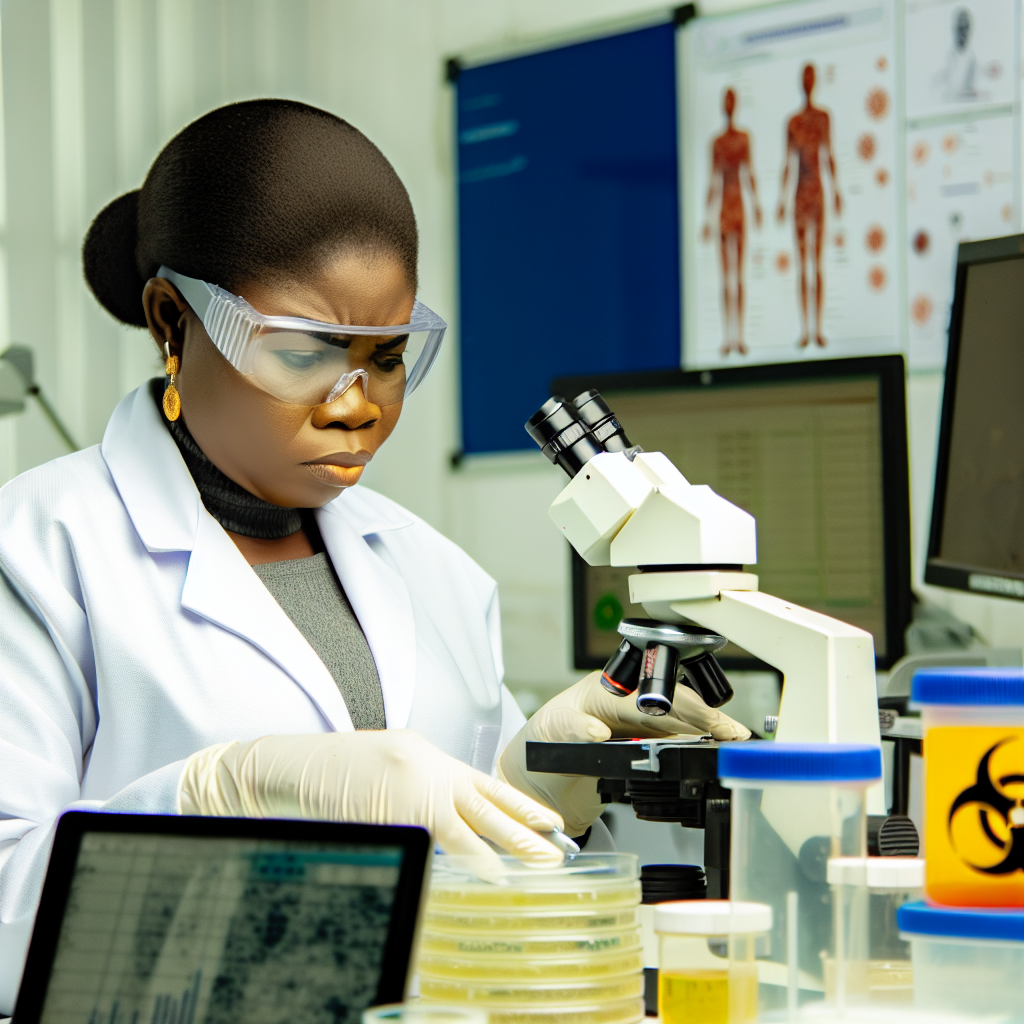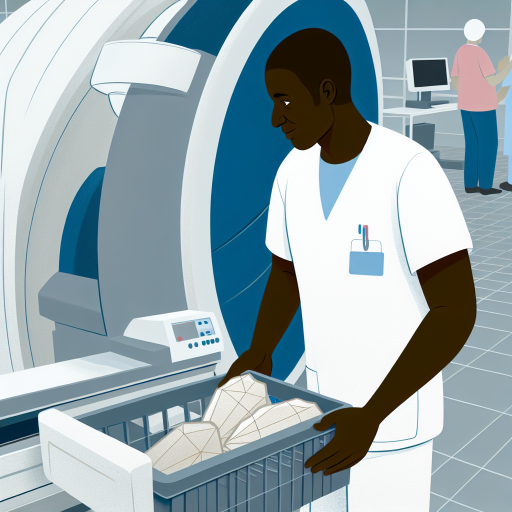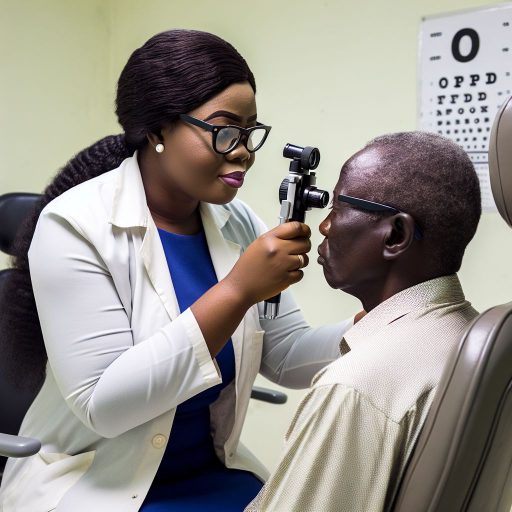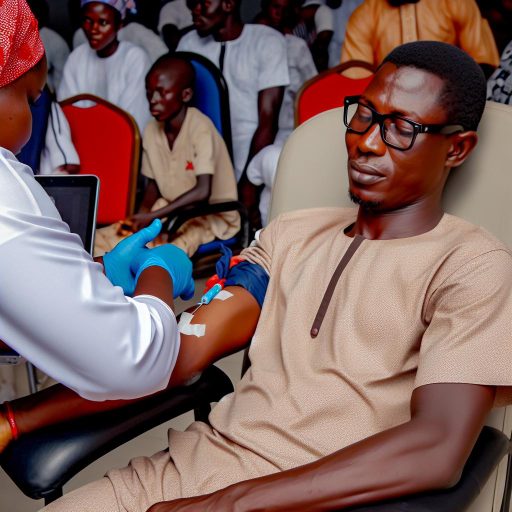Introduction:
Medical microbiology in Nigeria focuses on studying microorganisms that cause diseases.
Medical microbiology plays a crucial role in healthcare by helping to diagnose and treat various infectious diseases.
There are numerous career opportunities available in the field of medical microbiology in Nigeria.
Educational Requirements:
- Bachelor’s degree in medical microbiology or related field
- Postgraduate studies for specialization
- Internship and practical training
- Licensing and certification requirements
Obtaining a career in medical microbiology in Nigeria requires individuals to meet specific educational requirements.
These requirements are essential to ensure that professionals in this field have the necessary knowledge and skills to excel in their roles.
Bachelor’s Degree in Medical Microbiology or Related Field
The first step towards a career in medical microbiology in Nigeria is obtaining a Bachelor’s degree in medical microbiology or a related field such as microbiology, biology, or biochemistry.
This undergraduate program provides students with a foundational understanding of microbiology, immunology, and biochemistry.
Postgraduate Studies for Specialization
After completing a Bachelor’s degree, individuals interested in pursuing a career in medical microbiology can opt for postgraduate studies for specialization.
This may include a Master’s or Ph.D. program in medical microbiology or a related discipline.
Internship and Practical Training
Hands-on experience is crucial for aspiring medical microbiologists in Nigeria.
As part of their educational journey, students are required to undergo internships and practical training in laboratories, hospitals, or research facilities to gain practical skills in analyzing and identifying microorganisms.
Licensing and Certification Requirements
Professionals in medical microbiology must obtain the necessary licensing and certification to practice in Nigeria.
This process typically involves passing a licensing exam and meeting specific criteria set by regulatory bodies in the country.
Meeting these educational requirements is essential for individuals aspiring to build a successful career in medical microbiology in Nigeria.
By acquiring the right education and training, professionals can contribute effectively to the field and make a positive impact on healthcare outcomes in the country.
Job Opportunities:
Clinical Microbiologist in Hospitals and Clinics
Clinical microbiologists in Nigeria have the opportunity to work in hospitals and clinics.
They are responsible for diagnosing and treating infectious diseases.
They work closely with healthcare providers to identify pathogens.
They also determine the most effective treatment options for patients.
Research Microbiologist in Universities and Research Institutions
Research microbiologists play a crucial role in advancing the field of medical microbiology.
They achieve this through research and experimentation.
They work in universities and research institutions, conducting studies.
These studies aim to better understand microorganisms.
They also focus on developing new treatment methods.
Public Health Microbiologist in Government Agencies
Public health microbiologists work in government agencies.
They monitor and control the spread of infectious diseases within the population.
They are involved in disease surveillance.
Outbreak investigations and public health education programs are also part of their role.
They aim to promote disease prevention throughout the community.
Industrial Microbiologist in Pharmaceutical Companies
Industrial microbiologists are employed by pharmaceutical companies.
They develop and produce vaccines, antibiotics, and other medical products.
They play a key role in ensuring the safety and efficacy of these products.
Conducting quality control tests is part of their responsibility.
They also monitor production processes to maintain standards.
You Might Also Like: Post-Procedure Diet for Restorative Dental Patients
Salary and Benefits:
Medical microbiologists in Nigeria can expect to earn competitive salaries based on their level of experience, qualifications, and the organization they work for.
The average salary range for medical microbiologists in Nigeria is between N150,000 to N400,000 per month.
In addition to a competitive salary, medical microbiologists often receive benefits such as health insurance, retirement plans, and bonuses.
These benefits can vary depending on the employer and may include other perks like paid time off, professional development opportunities, and flexible work arrangements.
Furthermore, there are ample opportunities for career advancement in the field of medical microbiology in Nigeria.
Transform Your Career with Expert Guidance
Get personalized mentorship consulting that’s tailored to your unique path. Our expert advice is actionable and exclusive.
Get StartedWith additional training, certifications, and experience, medical microbiologists can progress to higher positions such as laboratory managers, research scientists, or academic professors.
Salary increments are also common in this field, especially for those who demonstrate exceptional skills and drive.
Many organizations in Nigeria recognize and reward top performers with salary increases, bonuses, and other incentives to motivate them to continue delivering high-quality work.
Overall, medical microbiologists in Nigeria enjoy a rewarding career with competitive salaries, comprehensive benefits, and opportunities for professional growth and development.
- Average salary range for medical microbiologists in Nigeria
- Benefits such as health insurance, retirement plans, and bonuses
- Opportunities for career advancement and salary increments
Gain More Insights: Prominent Paediatricians in Nigeria
Job Responsibilities:
Medical microbiologists in Nigeria play a crucial role in the healthcare system.
They carry out a variety of job responsibilities.
These professionals are trained to analyze and identify microorganisms that cause diseases.
Their work is essential for the prevention and treatment of infectious illnesses.
Let’s delve into the specific job responsibilities of medical microbiologists in Nigeria:
Performing microbiological tests and analyses
Medical microbiologists are responsible for conducting various laboratory tests.
These tests help identify pathogens such as bacteria, viruses, fungi, and parasites in clinical specimens.
They use specialized techniques and equipment to isolate and analyze microorganisms.
Samples include blood, urine, sputum, and tissues.
These tests help in diagnosing infections and determining the appropriate treatment for patients.
Identifying and characterizing microbes
After isolating microorganisms from clinical samples, medical microbiologists must accurately identify the species.
They also identify the strain of the pathogens present.
Biochemical, molecular, and immunological methods are used for characterization.
This information is crucial for understanding the nature of infectious diseases.
It aids in developing effective treatment strategies.
Conducting research studies on infectious diseases
Medical microbiologists in Nigeria are actively involved in research.
They investigate the epidemiology, pathogenesis, and antimicrobial resistance of infectious agents.
These professionals design and conduct studies to improve diagnostic methods.
They also work to develop new vaccines and enhance antimicrobial therapies.
By engaging in research, they contribute to the advancement of knowledge in the field of medical microbiology.
This work helps combat emerging infectious diseases.
Developing and implementing infection control measures
One of the primary responsibilities of medical microbiologists is to prevent the spread of infections.
They work with infection control teams to develop protocols.
These protocols cover hand hygiene, sterilization, disinfection, and waste management.
By implementing strict infection control measures, they help minimize the risk of healthcare-associated infections.
Medical microbiologists protect both patients and healthcare workers.
Gain More Insights: Anatomical Pathology Equipment Used in Nigeria
Challenges in the Field:
– Limited funding for research projects
– Lack of advanced equipment and facilities
– High competition for job vacancies
– Public misconceptions about microbiology
One of the major challenges faced by professionals in the field of medical microbiology in Nigeria is the limited funding available for research projects.
This lack of financial support hinders the progress of important studies and limits the scope of potential breakthroughs.
Another significant challenge is the lack of advanced equipment and facilities in many research institutions and laboratories across the country.
Without access to state-of-the-art tools, microbiologists struggle to conduct cutting-edge research and keep up with global standards.
Furthermore, there is a high level of competition for job vacancies in the field of medical microbiology.
With a limited number of positions available, qualified professionals often find themselves vying for the same opportunities, making it difficult for many to secure stable employment.
Moreover, public misconceptions about microbiology pose a challenge to professionals working in the field.
Many people do not fully understand the importance of microbiology in healthcare and may not appreciate the vital role that microbiologists play in disease prevention and treatment.
In order to address these challenges, it is crucial for government agencies, educational institutions, and healthcare organizations to prioritize funding for research projects in medical microbiology.
Investing in advanced equipment and facilities is also essential to ensuring that professionals have the tools they need to conduct impactful research.
Additionally, efforts should be made to create more job opportunities for microbiologists in both the public and private sectors.
By expanding the number of available positions, professionals can have greater access to stable employment and opportunities for career growth.
Finally, raising public awareness about the field of medical microbiology and dispelling common misconceptions can help to increase appreciation for the important work that microbiologists do.
By engaging with the community and highlighting the impact of microbiology on healthcare, professionals can help to educate and inform the public.
Find Out More: Popular Veterinary Clinics in Major Nigerian Cities

Skills and Qualities Needed:
When considering a career path in medical microbiology in Nigeria, it is essential to possess a specific set of skills and qualities that will enable you to excel in this field.
- Attention to detail and precision
- Strong analytical and problem-solving skills
- Ability to work in a team and communicate effectively
- Adaptability to changing technologies and research methods
Attention to detail and precision: One of the most critical skills required in medical microbiology is the ability to pay close attention to detail and maintain precision in your work. This is crucial when handling sensitive laboratory tests and experiments that require accuracy.
Strong analytical and problem-solving skills: Medical microbiologists are tasked with analyzing complex data and identifying patterns or trends that could lead to important discoveries. Having strong analytical and problem-solving skills is essential in effectively interpreting research findings.
Ability to work in a team and communicate effectively: Collaboration is a key aspect of medical microbiology, as researchers often work in teams to conduct experiments and analyze results. Being able to work well with others and communicate effectively is essential for successful teamwork in this field.
Adaptability to changing technologies and research methods: Medical microbiology is a rapidly evolving field, with new technologies and research methods constantly emerging. To stay current and relevant, it is important to be adaptable and open to learning new techniques and methodologies.
Continuing Education and Professional Development:
Medical microbiologists in Nigeria must engage in continuous learning and development to stay relevant in their field.
Here are some key ways they can do so:
Attending conferences and workshops:
Conferences and workshops provide opportunities for medical microbiologists to learn about the latest research, technologies, and best practices in their field.
They also offer chances to network with other professionals and experts, fostering collaborations and sharing knowledge.
Pursuing advanced degrees and certifications:
Obtaining advanced degrees, such as a Master’s or Ph.D. in medical microbiology, can help professionals deepen their knowledge and expertise in specialized areas.
Certifications, like the American Society for Microbiology (ASM) certification, can also enhance their credibility and job prospects.
Keeping up-to-date with the latest developments in the field:
Medical microbiologists need to stay abreast of new discoveries, technologies, and methodologies in their field.
Subscribing to scientific journals, attending webinars, and participating in online courses are some ways they can stay informed and updated.
Networking with other professionals in the industry:
Building a strong professional network is crucial for medical microbiologists to exchange ideas, seek mentorship, and explore new career opportunities.
Joining professional associations, attending industry events, and participating in online forums can help them connect with peers and experts in the field.
Medical Microbiology’s Impact on Healthcare
Medical microbiology plays a crucial role in healthcare by identifying and treating infectious diseases.
Aspiring microbiologists should stay focused and pursue their career goals with determination.
Success in the field requires continuous learning, staying updated with the latest technology, and research.
The industry of medical microbiology in Nigeria holds great potential for growth and advancement for professionals.
Additional Resources
The Nigeria health sector and human resource challenges
Enhancement of Health Research Capacity in Nigeria through North …




